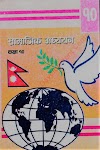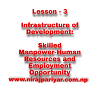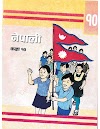Humility
Summary and Exercise | Class 12 English notes
Unit 4: Humility
Before reading
Answer the following questions.
a. What do you know about
the Chinese civilization?
Ans. Chinese civilization is one of the ancient civilizations of
the world. It was very rich in art, culture, innovation, etc.
b.
Are there any similarities between South Indian and Chinese civilizations?
Discuss.
Ans. Yes, there are some
similarities between south Indian and Chinese civilizations. Both are ancient,
rich, and deep histories and heritages.
- Understanding
the text
Answer the following questions.
a.
Describe the claim of the Chinese nationalists about human history.
Ans. Chinese nationalists
claim that human history began with the yellow emperor and the Xia and Shang
dynasties.
b.
What do pious Muslims believe about human history?
Ans. Pions Muslims believe all the history after the revelation of
the Quran to revolve around the Muslim ummah.
c.
What did the Aztecs firmly believe about the universe?
Ans.
Aztecs firmly believed that without their sacrifices each year, the sun would
not rise, and the entire universe would disintegrate.
d.
What, according to the essay, are the universal human abilities?
Ans. The universal human abilities are mortality, art,
spirituality, and creativity, embedded in our DNA.
e. How
are the basic yoga postures derived from the shape of the Hebrew alphabet
letters?
Ans. Trikonasana,
Tuladandasana, etc., are the basic yoga postures derived from the shape of the
letter of the Hebrew alphabet.
- Reference to the
context
a. How
do Hindu nationalists refute the Chinese claim that human history really began
with the Yellow Emperor and the Xia and Shang dynasties? Whom Do you agree
with, and why?
Ans. In this chapter,
Harari tells us that humility is a quality that most cultures lack. Each group
of religions believes itself to be the center of the universe and the inventor
of the most important philosophies and contributions. Moreover, by this
thought, they want to increase their followers. Chinese and Hindu nationalists
have their own beliefs. Chinese nationalists retort that history really began
with the yellow emperor and the Xia and Shang dynasties. However, the Hindu
nativists refute the Chinese claim. They even argue that airplanes, nuclear
bombs, etc., were invented by ancient sages in the Indian subcontinent long
before. For example, Maharishi Bhardwaj invented rockets and airplanes,
Vishwamitra invented and used missiles, Acharya Kanad was the father of atomic
theory, and the Mahabharata accurately describes nuclear weapons.
b. The
author has dealt with a controversial debate on human history. Why do you think
history has been a major contested issue in the present world?
Ans. In the essay, Harari
has dealt with a controversial debate on human history. According to him, each
group a religion believes itself to be the center of the universe and the
inventor of the most important philosophies and contributions. Moreover, they
want to increase their followers number by this thought. However, no group is
truly unique. In the present world, history has been a major contested issue.
He took the example of Hindu, Muslim, Islam, Judaism, and Chinese dynasties. In
the present world, such issues are being accelerated in some parts of the
world. Molecular nanotechnology, Nuclear holocaust, science, and technology are
running side by side. All the groups/countries are willing to be influential in
the world. Nevertheless, humility is the main thing that the people must have,
but it is lacking, which is a significant issue. So, we have to puncture the
hot air balloon inflated by our tribes.
Reference beyond the text
a.
Write a short essay on The Conflicting History of Human Civilization.
Ans. Civilization refers
to the advancement in human culture in terms of technology. Science, politics,
and division of labor. The world is currently experiencing technological
changes which have made life better for everyone. The ancient civilization was determined
by factors like technology, trade, etc.
Historians have identified
the essential characteristics of civilization. Six essential characteristics
are cities, religion, social structures, writing, government, and art.
Civilization first appeared in Mesopotamia (Iraq) and later in Egypt.
Civilization ultimately developed on every continent except Antarctica. While
our ancestors have been around for about 6 million years, the modern form of
human-only evolved about 2,00,000 years ago. Civilization has led to the
integration
of the world, and many
discoveries are still being made even now. Modern society has been transformed
through civilization. Modern technology has really facilitated civilization,
and we, therefore, envisage a more civilized world in the future.
b. The
author claims, “Since it is more polite to criticize one’s own people than to
criticize foreigners.” Do you agree with his claim? Give your reasons.
Ans. Criticism is a
necessary part of life. We will endure criticism for most of our young life,
from corrections to our penmanship to comments about our performance in a
professional setting. Inevitably, many of these pieces of criticism will be
purely constructive, helping us figure out what we are doing wrong and putting
us on the fastest path to improvement. However, some of these pieces will cut
as profoundly, serving as an insult as heavily as they serve as criticism.
When it is our turn to
give criticism, we want to be sure our comments fit the description of the
form. Remaining polite and constructive will help those under. We feel better
about thin work and ourselves and will make a better impression on those above
us.
In the essay; the author
claims, “Since it is more polite to criticism one’s own people than to
criticize foreigners.” yes, I agree with this claim that when we criticize our
own’s people politely, it will help to improve his doing and such criticism
will be purely constructive. We can find out how we think about the criticism
and choose our words to make this positive influence. The positive changes will
later help us too. However, for other people/foreigners, we will be unable to
know her thinking about criticism even if it is polite. Sometimes, our polite
criticism also acts as an insult to him/her and can create a big issue.


.png)


.jpeg)
.png)



.gif)



0 Comments